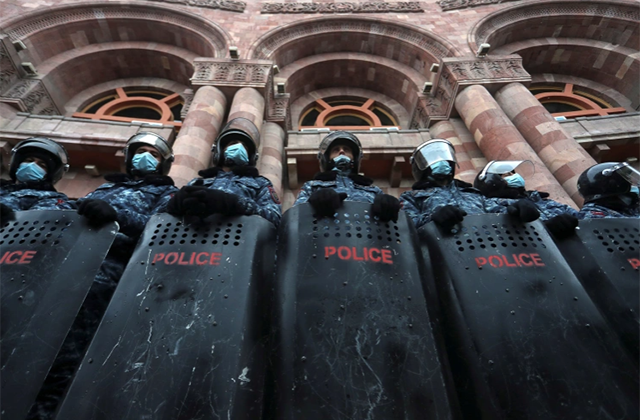
Armenian draft legislation would give government sweeping wartime censorship powers

Stockholm, January 19, 2022 – Armenian authorities should not use military conflicts as an excuse to curtail press freedom and should rework clauses in a draft bill that would threaten press freedom, the Committee to Protect Journalists said Thursday.
On January 6, the public comment period closed for a bill drafted by the Ministry of Justice in late 2022; when the ministry has evaluated those comments, it can decide whether to send the bill to parliament, according to news reports and local press freedom advocates who spoke with CPJ.
In the draft version circulated for public comment in December, the bill empowered authorities under conditions of martial law to temporarily block websites, apps, and social media networks and “partially or completely” restrict internet access in the country. That draft did not specify any restrictions on authorities’ ability to take such actions or any way for affected parties to appeal the decisions.
The draft also authorized the government of Armenia—which is involved in a protracted conflict over disputed territory with neighboring Azerbaijan—to intervene in television and internet broadcasting to disseminate information and ensure that films and programs feature “exclusively military patriotic content.”
“The blanket powers of censorship in a bill drafted by Armenia’s Ministry of Justice grant the state far too much discretion to block websites, cut off the country’s internet, and censor news outlets,” said Gulnoza Said, CPJ’s Europe and Central Asia program coordinator, in New York. “Armenian authorities should revise this bill and conduct thorough consultations with media representatives before putting it forward in a new form.”
Artur Papyan, director of the Media Diversity Institute, and Ashot Melikyan, chair of the Committee to Protect Freedom of Speech, two local free speech groups, told CPJ by phone that Armenia’s ruling Civil Contract party has a large enough parliamentary majority to pass the bill, but hoped that the Ministry of Justice will consult with media advocacy groups and amend the disputed clauses.
Eleven local press freedom groups, including Papyan and Melikyan’s organizations, published a statement criticizing the draft bill on January 12. Media rights groups are concerned that once a mechanism for blocking websites and the internet is established, authorities will seek to gradually expand its use, Papyan told CPJ.
Papyan and Melikyan said that the broad, unrestricted powers the draft would give the government, coupled with the lack of transparency over decisions, could lead to politically motivated decisions. They said the bill is particularly worrying given the government’s intolerance of criticism during the war in 2020.
During the 2020 Armenia-Azerbaijan war, a temporary government decree prohibited the publication of reports “criticizing” or “questioning the effectiveness” of state actions concerning the conflict, leading to the forced takedown of hundreds of articles and fines issued to more than a dozen news outlets. Authorities also blocked many websites with Azerbaijani and Turkish domain names and the social media app TikTok.
Papyan told CPJ that Armenian authorities struggled to legally justify these blocks at the time, and he believes the current draft law seeks to give them such a justification for the future.
Armenia’s existing martial law allows authorities to confiscate media outlets’ equipment, establish special procedures for journalists’ accreditation, and “restrict freedom of opinion in accordance with the law.”
In July 2022, Armenia’s prosecutor general proposed legislation that would empower the government to block websites, citing the need to censor harmful material such as instructions on committing suicide or selling drugs. The proposal was dropped following criticism by media organizations, Papyan said.
CPJ’s email to the Ministry of Justice did not receive a reply.

























